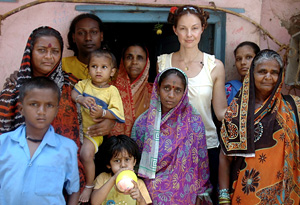Ashley Judd Interviews Half the Sky Author Nicholas Kristof

Photo: Courtesy of PSI.org
After years spent working with international health organization PSI and the HIV education group YouthAIDS, Ashley Judd could be considered as much a humanitarian activist as a glamorous actress. Here, she interviews Pulitzer Prize–winning New York Times columnist and author Nicholas Kristof about the global impact of his book (co-written with his wife, Sheryl WuDunn) Half the Sky.
Ashley Judd: You've drawn global attention to the unique needs and challenges of women in the developing world. Is the battle to bring attention to this issue being won or lost? And how do you feel about your contribution, both through your columns and the extraordinary book, Half the Sky, you and your wife, Sheryl, have written?Nicholas Kristof: Oh, the battle is definitely being won. There's no question that "international women's issues" are going from a fringe concern and a "soft" issue to a serious topic in the spotlight. Partly that's because women's rights are increasingly recognized not only as a justice issue but also as a way to fight poverty and reduce civil conflict. When you have American generals in Afghanistan trying to get more girls in school because they recognize that that's an effective strategy to undercut the Taliban, you know things have changed. And the Council on Foreign Relations used to be the place to discuss missile shields and Middle East politics, while now it is also discussing maternal mortality and human trafficking.
At The New York Times, I was delighted to see an article about maternal deaths as the lead story on the front page in May. We in the news media traditionally haven't been great at covering these issues, and the lead story traditionally was reserved for some ponderous pronouncement by a president or prime minister. So to see dead mothers being treated with equal seriousness was a welcome surprise and reflects the way these issues are rising on the agenda.
The tide was already coming in, but I hope that Half the Sky helped it gain a bit of momentum. One of the greatest challenges is how to reach beyond the choir, and I think the book clubs that have chosen Half the Sky and the universities that chose it for a college-wide read have helped expose the ideas in it to people who were outside that choir. One of the most exciting things for Sheryl and me has also been the number of readers who have started giving to clubs or aid organizations to try to make a difference.



